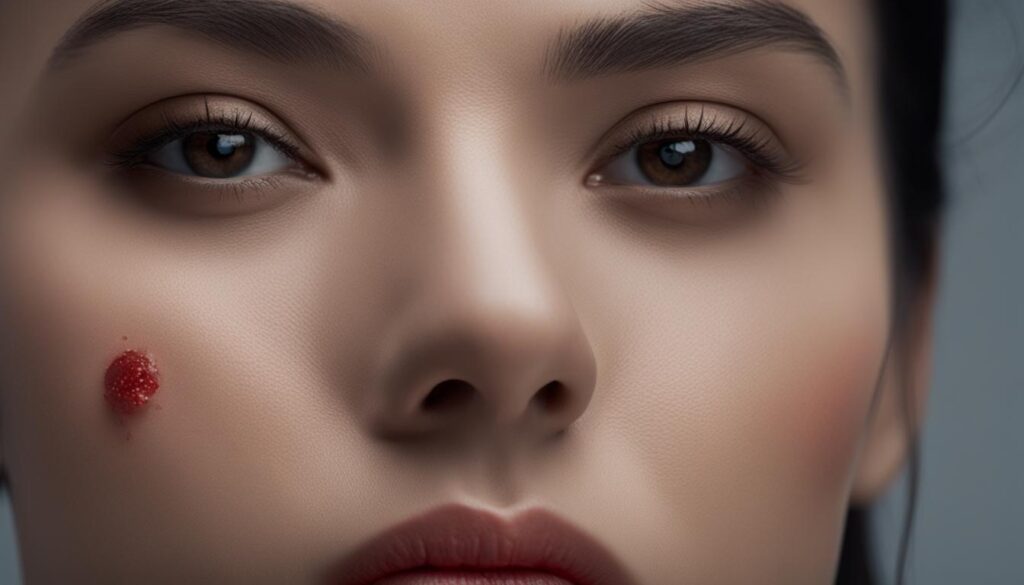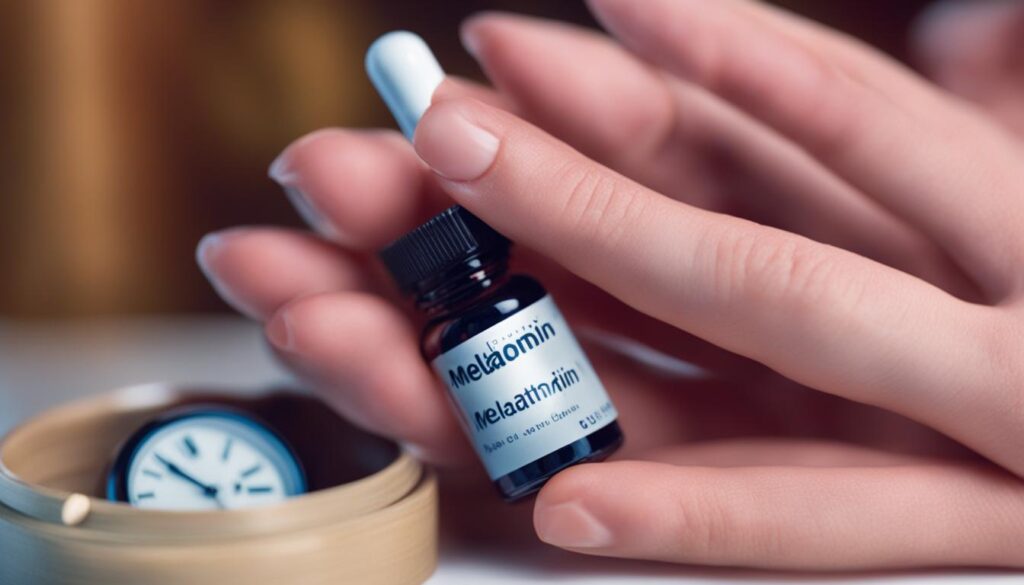As a professional copywriting journalist, I have written extensively about different health topics. In this article, we will explore the potential connection between melatonin and acne. Melatonin is a hormone that regulates sleep patterns and is commonly used as a supplement to aid sleep. However, there have been concerns about melatonin’s potential side effects, including the development of acne.
Before we delve into the possible relationship between melatonin and acne, let’s first get familiar with melatonin and its effects. We will also explore the underlying causes of acne and the various factors that contribute to its development. This article aims to provide a comprehensive understanding of the potential connection between melatonin and acne based on available scientific studies and evidence.
Key Takeaways:
- Melatonin is a hormone that regulates sleep patterns.
- Melatonin supplements are often used as a sleep aid.
- There have been concerns about the potential side effects of melatonin, including acne development.
- Acne is a skin condition that has various underlying causes.
- It’s important to understand the potential impact of melatonin on hormonal levels and skin health.
Understanding Melatonin and its Effects
Before we delve into the potential link between melatonin and acne, let me provide some context on melatonin itself. Melatonin is a hormone that regulates sleep patterns and is primarily produced by the pineal gland in the brain. It helps our bodies maintain a healthy sleep-wake cycle, among other functions.
While melatonin is most commonly associated with sleep, it can also have an impact on our skin health. Studies have shown that melatonin has antioxidant and anti-inflammatory properties, which may help protect against UV radiation damage and support skin health.
Melatonin also has a role in regulating hormonal levels in the body. Research has suggested that it can help reduce levels of certain hormones, including testosterone, which is often associated with hormonal acne. On the other hand, melatonin may stimulate the production of estrogen, which may have a positive effect on skin health.
Melatonin and Skin Health
As mentioned, melatonin may have a positive impact on skin health due to its antioxidant and anti-inflammatory properties. It can help protect against UV radiation damage, which can lead to premature aging and other skin issues. Studies have also suggested that melatonin may help improve the skin’s barrier function, which can prevent dehydration and help maintain a healthy complexion.
Melatonin and Hormonal Acne
Hormonal acne is often associated with imbalances in hormone levels, particularly an increase in testosterone. As mentioned, melatonin may help reduce levels of testosterone, potentially reducing the likelihood of hormonal acne breakouts. However, the relationship between melatonin and hormonal acne is complex and may depend on several factors, including individual hormone levels and other underlying health conditions.
Overall, while melatonin is primarily associated with regulating sleep patterns, it can also impact our skin health and hormone levels. Understanding these effects is important in exploring the potential connection between melatonin and acne.
The Science Behind Acne Formation
Acne is a chronic skin condition that occurs when hair follicles become clogged with oil and dead skin cells. While it is most commonly associated with puberty, it can affect individuals of all ages.
The development of acne is multifactorial, with several factors contributing to its onset, including genetics, hormones, bacteria, and inflammation. These factors can interact in complex ways, making it challenging to pinpoint an exact cause of acne in each case.
When excess sebum, oil produced by the sebaceous glands in the skin, combines with dead skin cells, it can clog pores, leading to the formation of comedones, or blackheads and whiteheads. If bacteria, such as Propionibacterium acnes, proliferate in these clogged pores, it can trigger inflammation and the formation of papules, pustules, and cysts.
Several factors can contribute to the development of acne. These include genetics, hormonal fluctuations, environmental factors, certain medications, and lifestyle habits. Stress, diet, and poor skincare practices can also play a role in acne formation.
Genetics
Studies have shown that genetics can play a role in acne development. If an individual’s parents or siblings have acne, they are more likely to develop it as well. This suggests that genetic factors can influence the susceptibility to acne.
Hormones
Hormones also play a significant role in acne formation. Androgens, male hormones that are present in both men and women, stimulate the sebaceous glands’ production of oil. During puberty, androgen levels increase, leading to an increase in sebum production, which can contribute to acne development. Women may also experience hormonal fluctuations during their menstrual cycle, pregnancy, or menopause, leading to acne breakouts.
Bacteria
Propionibacterium acnes, bacteria that live on the skin, can contribute to acne development. When sebum and dead skin cells clog pores, it creates an oxygen-free environment that allows these bacteria to proliferate. This, in turn, triggers an immune response, leading to inflammation and the formation of acne lesions.
Inflammation
Inflammation is a crucial factor in acne development. When bacteria invade clogged pores, the body’s immune system responds by releasing inflammatory molecules, leading to redness, swelling, and pain. Chronic inflammation can lead to scarring, making it essential to manage inflammation in acne-prone skin.
Melatonin’s Impact on Hormones
Hormonal acne is a common skin problem caused by hormonal imbalances in the body. Melatonin is a hormone that plays a crucial role in regulating sleep and wake cycles. However, some studies have suggested that melatonin may also affect other hormonal levels in the body, including estrogen and testosterone.
While the exact mechanism of melatonin’s impact on hormones is not fully understood, some evidence suggests that it may increase estrogen levels and decrease testosterone levels in the body.
This hormonal imbalance caused by melatonin may contribute to the development of acne in some individuals. However, it’s important to note that not everyone who takes melatonin will experience this effect.
In addition, taking too much melatonin can have adverse effects on the body, including headaches, dizziness, and nausea. Therefore, it’s crucial to consult with a healthcare professional before taking melatonin supplements, especially if you are already prone to hormonal acne.
Can Taking Melatonin Cause Acne?
While there is no conclusive evidence that melatonin directly causes acne, its impact on hormonal levels may contribute to the development of acne in some individuals.
If you are concerned about developing acne from taking melatonin, it’s important to monitor your skin’s response closely. If you notice an increase in acne breakouts after taking melatonin, it may be best to stop taking it or consult with a healthcare professional for guidance.
Overall, while melatonin may have potential benefits for regulating sleep and wake cycles, it’s important to be aware of its impact on hormones and potential side effects. Talk to your healthcare provider before considering any melatonin supplements to mitigate the risk of acne breakouts or other adverse effects.
Melatonin’s Effect on Skin Health
Our skin is the largest organ in the human body and serves as a crucial barrier against environmental factors that can harm us. It’s no wonder that we want to keep it healthy and free from any issues. Melatonin is a hormone that the body produces naturally, and it is known to play a role in skin health. However, there has been some speculation that supplementing with melatonin can potentially lead to skin problems, including acne.
While some studies have suggested that melatonin may have positive effects on skin health, others have shown the opposite. One study found that melatonin may reduce skin damage caused by UV radiation, while another study linked melatonin to skin pigmentation changes. These conflicting findings suggest that more research is needed to determine the exact effects of melatonin on skin health.
It’s also essential to consider potential side effects of melatonin supplementation. Some individuals may experience allergic reactions, digestive issues, or even worsened sleep problems. Additionally, melatonin may interact with certain medications, including blood thinners and immunosuppressants, so it’s crucial to discuss the use of melatonin with a healthcare professional before beginning any supplementation.

Ultimately, while melatonin does appear to have some potential benefits for skin health, there is not currently enough evidence to definitively claim that it is either entirely helpful or harmful. If you’re taking melatonin and notice any skin changes or issues, it’s important to consult with a healthcare professional to determine the cause and possible solutions.
Examining Scientific Studies
When it comes to understanding the potential link between melatonin and acne, it’s crucial to examine the available scientific studies and evidence. Although there are limited studies specifically investigating the relationship between melatonin and acne, some research has explored the impact of melatonin on skin health and hormonal levels, which can be relevant to acne development.
One study published in the International Journal of Dermatology found that melatonin levels in the skin were significantly reduced in people with acne compared to those with healthy skin. This suggests that melatonin may play a role in maintaining skin health and potentially preventing acne. However, more research is needed to confirm this hypothesis.
Another study published in the Journal of Pineal Research investigated the effect of melatonin on sebum production, which can contribute to acne development. The study found that melatonin reduced sebum production in skin cells, indicating that it may have a beneficial effect on acne-prone skin.
However, it’s important to note that these studies provide only preliminary evidence, and further research is needed to fully understand the impact of melatonin on acne development and prevention.
In conclusion, while the available scientific studies suggest that melatonin may have a beneficial impact on skin health and potentially prevent acne, more research is needed to fully understand the connection between melatonin and acne development. If you are concerned about the potential acne-causing effects of melatonin, it’s always best to consult with a healthcare professional.
Other Factors Contributing to Acne
While melatonin may have an impact on acne, it’s important to recognize that several other factors can contribute to the development of acne-prone skin. Understanding these factors can help you take proactive measures to mitigate the risk of acne breakouts. Here are some other key contributors to acne:
Hormonal Changes
Fluctuations in hormonal levels can trigger acne breakouts. This is why many teenagers experience acne during puberty when the body’s hormonal levels are changing.
Poor Diet
A diet high in processed foods, sugar, and unhealthy fats can contribute to the development of acne-prone skin. Eating a well-balanced diet rich in fresh fruits and vegetables, lean protein, and healthy fats can help keep your skin clear.
Stress
Stress can trigger the release of hormones that stimulate oil production and contribute to the development of acne. Finding effective ways to manage stress, such as through exercise or relaxation techniques, can help keep your skin clear.
Genetics
Some people may be genetically predisposed to acne. If you have a family history of acne, you may be more likely to develop it yourself.
Improper Skin Care
Using harsh skincare products or failing to properly cleanse your skin can contribute to the development of acne. It’s important to use gentle products and establish a skincare routine that works for your skin type.

By understanding these other factors contributing to acne, you can take proactive measures to keep your skin clear and healthy. While melatonin may have an impact on acne for some individuals, it’s important to consider all potential contributors to acne-prone skin.
Mitigating the Risk of Acne from Melatonin
If you are concerned about the potential acne-causing effects of melatonin, there are some practical tips you can follow to minimize the risk.
Avoid Excess Dosage
Stick to the recommended dosage of melatonin supplementation and avoid taking excessive amounts. Higher doses of melatonin may increase the risk of side effects, including acne breakouts.
Monitor Your Skin’s Response
Pay attention to your skin’s reaction to melatonin supplementation. If you notice any changes, including acne breakouts, consider reducing or discontinuing the use of melatonin.
Consult with a Healthcare Professional
If you have concerns about the potential acne-causing effects of melatonin, consult with a healthcare professional. They can provide guidance on whether melatonin is suitable for you and recommend alternative methods for sleep regulation if necessary.
Consider Combination Therapy
Combining melatonin supplementation with other acne treatments may be effective in mitigating the risk of acne breakouts. Consult with a dermatologist or healthcare professional for guidance on appropriate combination therapy.
Keep in mind that while melatonin may have potential side effects, it can also have significant benefits for individuals struggling with sleep disorders. By following these tips and monitoring your skin’s response, you can benefit from melatonin supplementation while minimizing the risk of acne breakouts.
Conclusion
After conducting a thorough investigation into the potential link between melatonin and acne, I have concluded that there is evidence to suggest that melatonin may indeed cause or worsen acne breakouts in some individuals. While the exact mechanism behind this connection is not yet fully understood, it appears that melatonin’s impact on hormonal levels and skin health may play a role.
It’s important to note that not everyone who takes melatonin will experience acne as a side effect. However, if you have noticed an increase in acne breakouts since starting melatonin supplementation, it may be worth considering alternatives or adjusting your dosage.
If you are concerned about the potential impact of melatonin on your skin, I recommend consulting with a healthcare professional. They can provide guidance on the best course of action and help you determine the underlying cause of your acne breakouts.
Overall, while further research is needed to fully understand the connection between melatonin and acne, it’s clear that this topic warrants attention. By staying informed and taking steps to mitigate the risk of acne from melatonin, individuals can continue to benefit from its sleep-promoting effects while maintaining healthy skin.
SEO keywords: can melatonin cause acne
FAQ
Can melatonin cause acne?
The connection between melatonin and acne is still being studied. While some individuals may experience acne breakouts when taking melatonin, more research is needed to determine the exact relationship. It’s important to monitor your skin’s response and consult with a healthcare professional if you have concerns.
What are the effects of melatonin on the skin?
Melatonin may have various effects on the skin, including potential impacts on skin health and acne development. However, the exact mechanisms and extent of these effects are still being investigated.
How does acne form?
Acne is formed when hair follicles become clogged with oil, dead skin cells, and bacteria. This clogging leads to the development of pimples, blackheads, and whiteheads.
Does melatonin affect hormonal acne?
Melatonin has the potential to influence hormone levels in the body. As hormonal imbalance is often associated with acne breakouts, melatonin may have an indirect impact on hormonal acne. However, more research is needed to fully understand this relationship.
Can melatonin cause skin issues?
While melatonin is generally considered safe, it’s possible that it may cause skin issues, including acne, in some individuals. However, this varies from person to person, and more research is needed to determine the exact effects of melatonin on skin health.
What do scientific studies say about melatonin and acne?
Scientific studies have explored the connection between melatonin and acne, but more research is needed to draw definitive conclusions. Some studies suggest a potential link, while others have found inconclusive results. It’s important to consider the available evidence and consult with a healthcare professional.
Are there other factors that contribute to acne?
Yes, acne can be influenced by various factors, including genetics, hormones, diet, stress, and skincare routines. While melatonin may play a role, it’s essential to consider these other contributing factors when addressing acne-prone skin.
How can I minimize the risk of acne from melatonin?
If you are concerned about potential acne-causing effects of melatonin, there are steps you can take to mitigate the risk. These include maintaining a consistent skincare routine, keeping your skin clean, and consulting with a healthcare professional for personalized guidance.
What is the conclusion regarding melatonin and acne?
Based on the available evidence, melatonin may have a potential connection to acne development for some individuals. However, further research is needed to fully understand this relationship. It’s important to monitor your skin’s response and consult with a healthcare professional if you have concerns.


